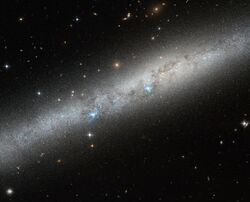Astronomy:IC 5052
| IC 5052 | |
|---|---|
 IC 5052 by Hubble Space Telescope | |
| Observation data (J2000 epoch) | |
| Constellation | Pavo |
| Right ascension | 20h 52m 05.6s[1] |
| Declination | −69° 12′ 06″[1] |
| Redshift | 0.001948 ± 0.000010 [1] |
| Helio radial velocity | 584 ± 3 km/s[1] |
| Distance | 24 ± 6.0 Mly (7.4 ± 1.9 Mpc)[1] |
| Apparent magnitude (V) | 10.6 [2] |
| Characteristics | |
| Type | SBd [1] |
| Apparent size (V) | 5.9′ × 0.8′ [1] |
| Notable features | Viewed edge-on |
| Other designations | |
| ESO 074-G015, AM 2047-692, PGC 65603[1] | |
IC 5052 is a barred spiral galaxy located in the constellation Pavo. It is located at a distance of circa 25 million light years from Earth, which, given its apparent dimensions, means that IC 5052 is about 40,000 light years across. It was discovered by DeLisle Stewart on August 23, 1900.[3]
IC 5052 is viewed edge-on. When spiral galaxies are viewed from this angle, it is very difficult to fully understand their properties and how they are arranged. IC 5052 is actually a barred spiral galaxy – its spiral arms do not begin from the centre point but are instead attached to either end of a straight "bar" of stars that cuts through the galaxy's middle.[4] The profile of the galaxy is irregular, with the northwest side having a much higher surface brightness than the southeast side.[5] Also, one half of the galactic disk appears thicker that the other. A number of irregular dust lanes are observed across the disk, but none is prominent.[6] No bulge is observed.[5] A population of older stars has been detected off the center of the disk, as well as a stream-like structure, that could indicate a galaxy merger took place in the recent past.[7]
The galaxy is close enough that its stars can be resolved with large telescopes, with the brightest ones having an apparent magnitude of 21. The younger and hotter of the stars lie within HII regions, the largest of which have apparent diameters of at least 2 arcseconds.[8] These pockets of extremely hot newborn stars are visible across the galaxy's length as bursts of pale blue light, partially blocked out by weaving lanes of darker gas and dust.[4]
IC 5052 is characterised as an isolated galaxy, which doesn't belong to a group of galaxies.[9] The nearest large galaxy to IC 5052 is NGC 6744, which is characterised as the main disturber of IC 5052.[10]
References
- ↑ 1.0 1.1 1.2 1.3 1.4 1.5 1.6 1.7 "NASA/IPAC Extragalactic Database". Results for IC 5052. http://ned.ipac.caltech.edu/cgi-bin/nph-objsearch?objname=IC+5052.
- ↑ "Revised IC Data for IC 5052". http://spider.seds.org/ngc/revngcic.cgi?ic5052.
- ↑ Seligman, Courtney. "IC 5052 (= PGC 65603)". https://cseligman.com/text/atlas/ic50a.htm#ic5052.
- ↑ 4.0 4.1 "Blue bursts of hot young stars" (in en). 4 March 2013. https://www.spacetelescope.org/images/potw1309a/.
- ↑ 5.0 5.1 Eskridge, Paul B.; Frogel, Jay A.; Pogge, Richard W.; Quillen, Alice C.; Berlind, Andreas A.; Davies, Roger L.; DePoy, D. L.; Gilbert, Karoline M. et al. (November 2002). "Near-Infrared and Optical Morphology of Spiral Galaxies". The Astrophysical Journal Supplement Series 143 (1): 73–111. doi:10.1086/342340. Bibcode: 2002ApJS..143...73E.
- ↑ de Grijs, Richard; Peletier, Reynier F. (April 2000). "Tracing the vertical composition of disc galaxies through colour gradients". Monthly Notices of the Royal Astronomical Society 313 (4): 800–814. doi:10.1046/j.1365-8711.2000.03284.x. Bibcode: 2000MNRAS.313..800D.
- ↑ Streich, David; de Jong, Roelof S.; Bailin, Jeremy; Bell, Eric F.; Holwerda, Benne W.; Minchev, Ivan; Monachesi, Antonela; Radburn-Smith, David J. (2016). "Extragalactic archeology with the GHOSTS Survey". Astronomy & Astrophysics 585: A97. doi:10.1051/0004-6361/201526013.
- ↑ Sandage, A., Bedke, J. (1994), The Carnegie Atlas of Galaxies. Volume I, Carnegie Institution of Washington
- ↑ Karachentsev, I. D.; Makarov, D. I.; Karachentseva, V. E.; Melnyk, O. V. (20 March 2011). "Catalog of nearby isolated galaxies in the volume z < 0.01". Astrophysical Bulletin 66 (1): 1–27. doi:10.1134/S1990341311010019. Bibcode: 2011AstBu..66....1K.
- ↑ Karachentsev, Igor D.; Kaisina, Elena I.; Makarov, Dmitry I. (3 December 2013). "Suites of Dwarfs around nearby Giant Galaxies". The Astronomical Journal 147 (1): 13. doi:10.1088/0004-6256/147/1/13. Bibcode: 2014AJ....147...13K. http://cdsarc.u-strasbg.fr/viz-bin/nph-Cat/html?J/AJ/147/13/table1.dat.
External links
- IC 5052 on WikiSky: DSS2, SDSS, GALEX, IRAS, Hydrogen α, X-Ray, Astrophoto, Sky Map, Articles and images
- IC 5052 on SIMBAD
 |

